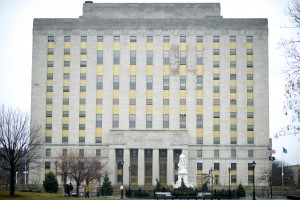Attorneys in our Impact Litigation Practice collaborate with all other practice areas at The Bronx Defenders to litigate challenges to systemic violations and injustices that affect larger groups of our clients, including racially-discriminatory policing, unequal access to housing and employment, government seizure of property, curtailment of parental rights in family court proceedings, immigration abuses, and other government misconduct. Our success in these complex cases is influenced by our community engagement efforts and our client base; we leverage the knowledge we gain from direct representation into critical policy changes that benefit the communities we serve in the South Bronx.
Active Matters:
- Ligon v. City of New York. Filed on March 28, 2012, this federal class action lawsuit challenges the constitutionality of Operation Clean Halls, a part of the NYPD’s stop-and-frisk program that allows police officers to patrol thousands of private apartments buildings across New York City. Learn more.
- Floyd v. City of New York. In the remedial process following the landmark class action that proved the NYPD’s use of the stop-and-frisk tactic was unconstitutional and racially discriminatory, the Impact Litigation Practice is leading a coalition of attorneys who represent the plaintiffs on three related class actions in an unprecedented effort to implement reforms based on input from the people most affected by the NYPD’s unlawful practices. Read the most recent filing here. And read the court’s order regarding documenting police-citizen encounters here.
- Trowbridge v. Cuomo. Filed on May 10, 2016, this federal class action seeks to end the massive court delays which violate the constitutional right to a speedy trial, the right to a trial, and the due process rights of thousands of people facing misdemeanor charges in the Bronx. Learn more.
- R.C. v. The City of New York. Filed on April 24, 2018, this class action lawsuit seeks to stop the City of New York and the NYPD illegally using and sharing information from sealed arrest records in defiance of long-standing privacy laws and seeks a declaration that the NYPD’s use and disclosure of sealed arrest records is unlawful and a court-ordered remedy that ends the practice. Learn more.
- Procedural Due Process Concerns in the Bronx Family Courts. In this report issued in August 2017, the Impact Litigation Practice identifies a widespread practice of protracted hearings under Section 1028 of the Family Court Act, which results in the prolonged and unwarranted separation of families. Members of the Impact Litigation team are working to advance reforms that resolve the statutory and constitutional violations identified through their investigation. Read the report here.
- Vazquez Perez v. Decker. Filed on November 15, 2018, this putative class action lawsuit challenges the unconstitutional practice of the Immigration and Customs Enforcement (ICE) and the Department of Homeland Security (DHS) for jailing immigrant New Yorkers for months before bringing them in front of a judge. Learn more.
- P.L. et al. v. U.S. Immigration and Customs Enforcement. Filed on February 12, 2019, this federal lawsuit challenges the Immigration and Customs Enforcement for refusing to bring immigrants to court for deportation hearings and forcing them to use a video teleconferencing to challenge their detention and deportation. Learn more.
- Velesaca v. Wolf. Filed on February 28, 2020, this federal class-action lawsuit challenges a recently-enacted policy of New York City-area federal immigration officials of jailing virtually all of the thousands of people they have arrested over the last three years. Before this policy, nearly half of those arrested on civil immigration offenses and deemed a low risk by the government were quickly released back to their families and communities while their immigration cases moved forward. Learn more.
Closed cases:
- The Bronx Defenders v. NYPD. Filed on August 4, 2016, this freedom of information lawsuit asks the Supreme Court of the State of New York to order the NYPD to comply with its legal obligation to disclose information pertaining to its policies and procedures regarding, and accounting for, millions of dollars in cash and property seized during arrests each year. Learn more.
- Encarnacion v. City of New York. Filed on January 8, 2016, this federal class action challenges the NYPD Property Clerk’s policy and practice of retaining personal property seized in connection with an arrest long after the criminal case is over. Learn more.
- Torres v. City of New York. On August 15, 2014, Plaintiffs filed a lawsuit against the City of New York challenging its pattern and practice of charging people for misdemeanor marijuana possession for what was really non-criminal conduct. The parties reached a favorable settlement on June 28, 2015. The Torres litigation followed Felix v. City of New York, brought by The Bronx Defenders and Emery Celli Brinckerhoff & Abady, LLC, which raised similar claims on behalf of a six additional plaintiffs. Both Torres and Felix were cases that culminated from, and were a part of, the advocacy and research conducted by The Bronx Defenders Marijuana Arrest Project. Co-counsel was Fisher & Byrialsen, PLLC. Attorneys in the Impact Litigation Practice include Johanna Steinberg, Jenn Rolnick Borchetta, Scott Levy, Niji Jain, and Mary Anne Mendenhall.
- Casale v. Kelly and Brown v. Kelly. In early 2012, The Bronx Defenders and Emery Celli Brinckerhoff & Abady, LLC secured a $15 million settlement on behalf of nearly 20,000 New Yorkers whom the police had charged using invalid loitering statutes. Judges in both state and federal courts had struck down the disputed laws as unconstitutional on the grounds that they violated the First Amendment and unfairly targeted poor, gay, and minority citizens. The NYPD, however, disregarded the court rulings and continued to charge tens of thousands of New Yorkers using the unconstitutional statutes. The final settlement in the case not only required New York City to pay out $15 million dollars, but also achieved the crucial measure of directing that thousands of unconstitutional convictions be expunged.

